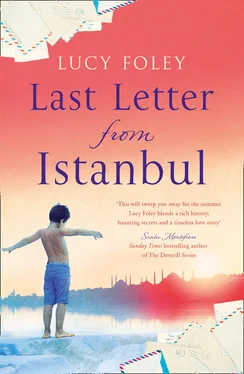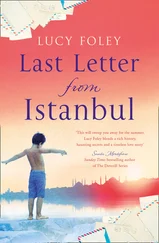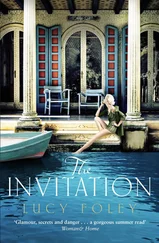As she alights, she feels exposed on the quay, imagining how she might appear to someone who knows her, what they would guess of her mission. That they might pity her – that is the worst of it. Far worse, certainly, than the censure they had shown previously. Her dead father’s innocence has been all but proven by the fact that the occupiers have done nothing to recognise or reward the family. What more did they have to lose to prove their support for the cause? A son lost, a daughter widowed … what more had to be sacrificed before they were considered free of suspicion?
For the first time in a long while she rather longs for her veil, for the shield of it. She keeps her head lowered, and at the same time detests her own cowardice. There is nothing shameful in what she is doing, only a little sad.
The path to the house, the private one through the trees and bushes immediately beside the water, has been exposed. Nur would have thought the thicket would have closed itself around it by now in an impenetrable tangle. In fact, had some self-preserving part of her hoped that she would be forced to turn back at this point? Now she must continue with the thing, see it through.
Here, too, are unexpected assaults of memory: scents of wild fig, olive, blue mint, bracken, mingling with the brine of the water. A pressure in her chest, a knot of tears that will not be shed, that cannot be relieved.
There is less magic in it up close than viewed from the water. Now visible are the places where the white paint is beginning to peel from the old grey wood beneath, how the elderly balconies sag with the weight of more than a century, that in the eaves of the roof are the fragile remains of birds’ nests from years gone by. Yet these flaws, for Nur, are as tenderly observed as those in the face of a loved one.
She is close enough now that she can hear the effect of the water in the boathouse, the strange echoes: the gargle and slap. The accompaniment to hours sitting on the little jetty reading a book, casting a line out to catch fish as her father had taught her – she was better at it than her brother. When she did land one, however small and spiny, Fatima would take great care to serve it at the next meal, transformed with lemon and parsley and tender cooking over fragrant wood. As a child she had sat on that platform with her ankles and feet submerged in the water, instantly cooling on a hot day. She is caught by the idea of it, it grows inside her. There is no one here to see. She makes her way down the stone steps, onto the wood of the platform, lowers herself until she is sitting, slips off her shoes and extends her bared feet into the water.
Sometimes, now, the old life seems as remote as one read about in a book. But this afternoon it seems very close at hand, an assault of memory. If she refuses to look at the great grey warships marshalled further downstream she can almost persuade herself that she is sitting here suspended in her past.
How old is she? She thinks. She is in control of this fantasy, she can choose. Twelve. The time before anything became complicated. Before talk of marriage, or propriety, before illness and death. She has just climbed a tree … it has left her hands and feet sticky with sap. She will wash them, here, in the waters of the Bosphorus before she casts out her fishing line.
The older women will be sitting in the women’s quarters, the haremlik , after a lunch of several courses. Perhaps they have friends visiting them from the city, in Parisian gowns that sit oddly with their veils. Or perhaps they have come from further afield, from Anatolia, traditional in loose silks, their fingernails stained with red dye. By now they will be deep in gossip. Or perhaps they have summoned a female miradju to entertain them all with tall tales. Most of these professional storytellers rely upon a carefully honed set of stories, most known fairly well to their listeners, yet still pleasing because of the unique style and flourishes of the teller. But the very best of them can invent narrative upon the spot, conjuring people and places straight from the imagination.
Once Nur told her mother that her greatest ambition was to become one of these women – and received a lecture on the importance of knowing one’s class. These women were still salespeople – no better than the simit sellers or the rag women – even if their currency was words.
Footsteps, behind her. Her father, come to join her in her fishing. Or perhaps he has brought with him the backgammon set, inlaid with ebony, ivory and mother-of-pearl. She turns.
Behind her, at the top of the steps, stands a man in a white robe, a pipe dangling precariously from his open mouth. A lit match burns unattended in his hand, forgotten in his surprise.
‘By Jove,’ he says, stepping quickly backward. And then, as the flame from the match climbs high enough to lick his fingers, ‘Ouch!’
An Englishman, half-dressed, here on the Asian side of the water. None of this makes any sense to Nur: she thought, hoped, that they were confined to Pera. He stares, she stares back. They are like two street cats, she thinks, watching one another warily.
‘By Jove,’ he says again, under his breath, as though the important thing is to say something – that by doing so he will wrest some control over the situation. Nur is standing, attempting to retrieve her slippers with furtive movements of her feet. She risks another quick glance. She has never seen an Englishman – indeed any man – dressed in such an outfit. It is a longish, very loose, very thin white shirt; if she were to allow herself to look properly she would realise that it does not quite preserve his modesty.
‘Well,’ he says fiercely, ‘what the devil are you doing here?’ He has made his pitch for the upper hand, she realises. ‘You don’t understand me, do you?’ His pride has marshalled itself. ‘This is private land. Private. Be gone with you …’ He raises an arm, imperious, points in the direction of the path. ‘Shoo!’
‘I suppose I might ask you the same question.’
He takes a step back.
She has learned this, especially in that time since the occupation began: to wield language, her command of it, as an instrument of power.
He shifts onto his other foot – and for a moment he seems to teeter. The surprise seems to have taken all the force out of him. He looks rather pale, she thinks, even for a pallid Englishman – there is a frailty that she had failed to see before, distracted by his odd attire and her surprise.
Now another figure is approaching, from the house. He is properly dressed, in British army khaki. Her stomach clenches. It is now that she becomes aware that she is effectively trapped on the jetty: these men on one side of her, the water on the other. She will stand her ground; she has done nothing wrong, after all.
There is something familiar about him, this other man. He, too, seems to be experiencing some struggle of recognition. He frowns. His eyes travel from her face to her bare feet, and back again. ‘It’s you. The woman with the books.’
Yes, she does recognise him. Not the face so much as the voice. But she will not give him the satisfaction of admitting it; in refusing she will retain the upper hand. ‘I do not know what you refer to.’
He frowns. ‘You don’t remember? Just two weeks ago … past the Galata bridge. I’m sure it was you. You dropped …’ a pause, then, in triumph, ‘a red notebook!’
A week ago. She was late, on her way to the school. There were painful negotiations with the linen buyer, who tried to convince her that the trade had reached saturation, and he could only offer a third of the usual price. She had to go through the whole charade; to turn on her heel and march away from him before he called her back. This had wasted a good quarter of an hour that she did not have spare.
Читать дальше












